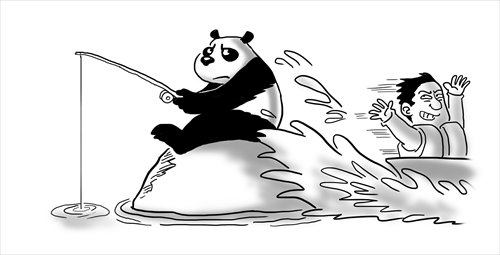HOME >> OP-ED
No dispute over China’s historical rights
By Lu Yang Source:Global Times Published: 2016-1-19 22:08:01

Illustration: Liu Rui/GT
The Jurisdictional Award hereafter referred to as "the Award"of the South China Sea (SCS) Arbitration provides that eight of the Philippines' Submissions involve issues not possessing an exclusively preliminary character. The Tribunal cannot determine whether it has jurisdiction over them without considering issues in the merits. Today I will review the Award concerning China's "invocation" of historical right to justify its SCS maritime claim and whether Meiji Jiao and Ren'ai Jiao is part of the Philippines' exclusive economic zone (EEZ) and continental shelf (CS).
Submission 1-2 contend that "China's maritime entitlements in the SCS, like those of the Philippines, may not extend beyond those permitted by the United Nations Convention on the Law of the Sea (UNCLOS)"; and that "China's claims to sovereign rights and jurisdiction, and to 'historic rights', with respect to the maritime areas of the SCS encompassed by the so-called 'nine-dash line' are contrary to UNCLOS and without lawful effect to the extent that they exceed the geographic and substantive limits of China's maritime entitlements under UNCLOS."
These Submissions intend to reflect a dispute concerning China's claim of "historical rights" to justify its extra-UNCLOS maritime claim within the nine-dash line. The Award considers these Submissions reflecting a dispute concerning the interpretation or application of UNCLOS, but not concerning sovereignty and sea boundary delimitation.
The Award said that a dispute "exists" on China's maritime claim within the Dotted Line based on China's historical rights in SCS. Paragraphs 164-168 indicate the evidence from 2009-2011 Sino-Philippine exchange of Note Verbales (NV). This conclusion is wrong based on my first commentary. Surprisingly, an agreement emerges from these NVs that some "Kalayaan Island Group" ("KIG") geological features qualify as islands and capable of generating territorial sea (TS), EEZ and CS; and UNCLOS is invoked by both states to claim maritime entitlements in SCS.
However, Paragraph 165 of the Award cut off the first message of the Philippines' 2011 NV. Careless readers might believe that such a dispute concerning China's claim on historical rights exists. Equally problematic is the interpretation of the term "relevant waters" in China's 2009 and 2011 NVs. Actually, the objective of China's 2009 NVs was to protest against two outer CS submissions to the Commission on the Limits of the Continental Shelf (CLCS) by Vietnam and Malaysia concerning two SCS maritime areas as their continental shelf.
Therefore, what is meant by "relevant waters" must be those submitted to CLCS. As Vietnam and Malaysia never submitted the entire waters within the Dotted Line, the "relevant waters" under China's NVs cannot possibly denote the entire areas within the Dotted Line. The Philippines and the Tribunal are enlarging a confined meaning of "relevant waters" to indicate the entire area within the Dotted Line, while there is no dispute left for the Tribunal to try.
The Philippines' Submission 5 claims that Meiji Jiao and Ren'ai Jiao are part of its EEZ and CS. Amazingly, Paragraph 172 of the Award re-formulated Submission 5 as follows: "In so doing, the Philippines has in fact presented a dispute concerning the status of every maritime feature claimed by China within 200 nautical miles of Meiji Jiao and Ren'ai Jiao." The Tribunal transformed Submission 5 into something else, concluding that a dispute can be reflected by this un-submitted submission despite the fact that in essence the dispute is related to sovereignty and territory.
During the July Hearing, the Philippines' lawyer, Philippe Sands, refused to provide information for all the islands and reefs in the Nansha Islands, as the Tribunal redefined the Philippines' Submission 5. Unprecedentedly, this behavior of the Philippines was tolerated. Mysteriously, the Tribunal concluded that the re-formulated Submission 5 reflected a dispute, even though that the Philippines provided nothing that showed that during the July Hearing.
Recently, the Philippines seems to have received the message from the Tribunal. During the November Hearing, Clive Schofield from Wollongong University who co-authored a paper with Robert Beckman abruptly changed his opinions about the legal status of maritime features in the Nansha Islands. Previously, Schofield and Beckman considered that 12 maritime features in the Nansha Islands fulfill the conditions of "islands" under Article 121 of UNCLOS. Now, Schofield, as part of the Philippines' legal team, told the Tribunal that none of the maritime features qualifies as an island.
I am clueless as to how the Tribunal is going to treat Schofield's new statement, if the Tribunal is willing to adhere to its duty of being equally fair, appearing and non-appearing, under Annex VII to UNCLOS. Will his two conflicting opinions all be discarded ? Or is his latter opinion is to be trusted?
No matter what happens, the fundamental problem remains. No dispute can be reflected by the Philippines' (but not the Tribunal's) Submission 5, which should have been barred from entering the merits phase. According to the non ultra petita principle declared by the ICJ in the Asylum Case the Tribunal has a duty to abstain from deciding points not included in the submission.
The author is a Beijing-based scholar of international relations and international law. opinion@globaltimes.com.cn
Posted in: Viewpoint